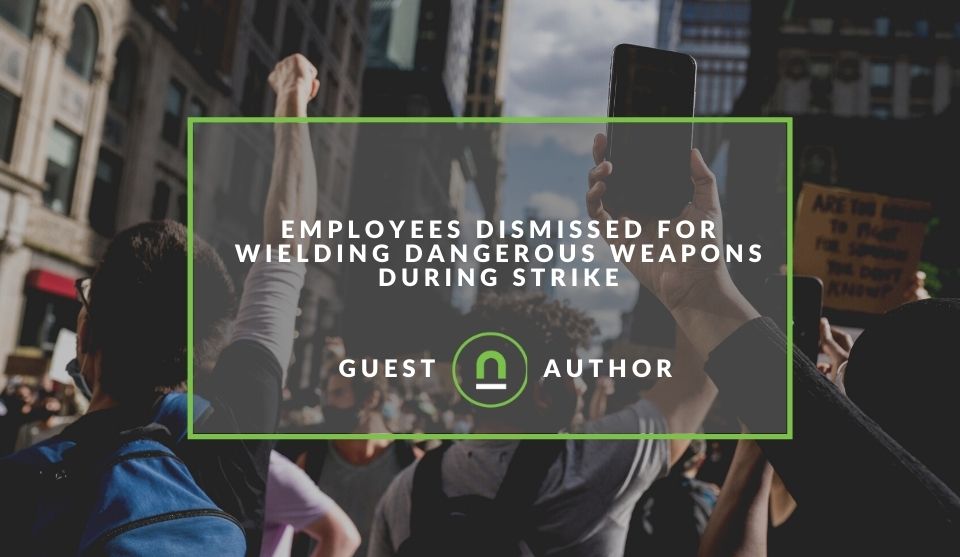Recent posts

Constructive Criticism
How to Load a Staple Gun with Heavy-Duty Staples
27 August 2025

Academia
Using Academic Help To Learn New Skills
26 August 2025

Doctors Orders
The Ultimate Dental Care Handbook
21 August 2025

Constructive Criticism
Electric Hoists in The Construction Industry
20 August 2025
Popular posts
Extravaganza
Trending Music Hashtags To Get Your Posts Noticed
24 August 2018
Geek Chic
How To Fix iPhone/iPad Only Charging In Certain Positions
05 July 2020
Extravaganza
Trending Wedding Hashtags To Get Your Posts Noticed
18 September 2018
Money Talks
How To Find Coupons & Vouchers Online In South Africa
28 March 2019
Employees Dismissed for Wielding Dangerous Weapons during Strikes
01 February 2022 | 0 comments | Posted by Calvin-James McKenzie in Get Court
Can employees be dismissed for wielding weapons during a strike? The answer to this question was “no”, according to both a bargaining council arbitrator and the Labour Court but finally ended up being “yes” in the Labour Appeal Court (“LAC”).
This is according to the case of Pailpac (Pty) Ltd v De Beer NO and Others [2021] 6 BLLR 570 (LAC), where members of the National Union of Metalworkers of South Africa, employed by Pailpac (Pty) Ltd (Pailpac), engaged in a national strike. The striking employees carried weapons such as sticks, PVC rods, sjamboks, and golf clubs.
As such, Pailpac charged them with “brandishing and wielding weapons during a strike” as per its revised Breaches of Discipline document (“revised BOD rules”). All of the offending employees were subsequently dismissed.
The dismissed employees brought an unfair dismissal dispute before a Bargaining Council for arbitration. The arbitrator found the dismissals to be substantively unfair and reinstated the dismissed employees retrospectively. The arbitrator reasoned that it would be unfair to hold them bound to a rule that they did not know existed or which was not effectively communicated to them.
Pailpac challenged this finding on review in the Labour Court, arguing that the arbitrator’s finding was not one that could reasonably have been reached on the evidence and other material which was before her. The Labour Court dismissed the review as it agreed with both the findings of the arbitrator and her analysis of the evidence in reaching her decision.
Unhappy with this outcome, Pailpac approached the LAC. The central issue to be decided by the LAC was whether, on the evidence, the employees knew or could reasonably have been expected to be aware of the rule prohibiting brandishing and wielding weapons during a strike.
Pailpac relied on two rules which were in place at the time of the strike. These rules were:
- A rule in its revised BOD rules which prohibits “brandishing or wielding of dangerous weapons”; and
- A clause in its picketing rules that read “[picketers may not] disrupt the normal functioning of the company or engage in unlawful or violent actions. No weapons of ANY kind are to be carried or wielded by the picketers.”
It was evident that the revised BOD rules were displayed on the notice board at the main entrance to the factory, close to the clocking station. The notice board was the ordinary method of informing employees of relevant information, and the employees were well aware of their obligation to read the communications posted on the notice board. The arbitrator and the Labour Court were aware of this fact.
The LAC accordingly held that in the circumstances, it was probable that the employees were aware of the rule or could reasonably have been expected to be aware of the rule. The LAC also stated that the arbitrator, and thereafter the Labour Court, had failed to have regard to the evidence that was placed before them. The appeal was upheld, and the employees’ dismissals were thus deemed to be substantively fair.
To conclude
In conclusion, besides the answer to the question posed at the beginning of this article, we can learn something else from this case. It is that, despite any existing policies in a workplace (whatever those policies may relate to), an employer must always take reasonable steps to draw the attention of its employees to such policies or rules. This will ensure that all employees will either be aware of the rule or could reasonably be expected to be aware of it.
Thus, an employer can protect itself against an allegation by a dismissed employee that they were unaware of a breached rule, as it will hold no water.
About the author
Calvin-James McKenzie is an admitted attorney currently engaged in consultancy work on a part-time basis who is looking for a permanent attorney position or work as a Freelance Legal Writer.
You can reach out to Calvin on LinkedIn
Tell us your story
Would you like to write for nichemarket just like Calvin-James has? Find out how to submit a guest post and when you're ready, you can contact us.
Are you looking to promote your business?
South African recruitment businesses can create your free business listing on nichemarket. The more information you provide about your business, the easier it will be for your customers to find you online.
Registering with nichemarket is easy; all you will need to do is head over to our sign up form and follow the instructions. If you require a more detailed guide on how to create your profile or your listing, then we highly recommend you check out the following articles.
Recommended reading
If you enjoyed this post and have time to spare why not check out these related posts and dive deeper down the rabbit hole that is career advice.
- How to List Online Courses on Your Resume
- How Does Resume Parsing Speed up The Recruitment
- Study Shows Hard Interviews Result In Better Jobs
- Why Your Resume Should Be One Page
- 5 Things to Know Before Moving to Africa for Work
- 7 Tips For Recruiting Foreign Workers
- Myths About Remote Interviews
- 9 Recruiting Tactics For Bold Recruiting Leaders
Tags: Legal, Guest Post
You might also like
Electric Hoists in The Construction Industry
20 August 2025
Posted by Phil Lazenby in Constructive Criticism
Electric hoists are essential in construction, boosting efficiency and safety. They lift heavy materials with precision, reducing manual labour risks...
Read moreShould You Consider Selling Your MacBook Pro?
19 August 2025
Posted by Kelly Wilson in Geek Chic
Unsure about selling your MacBook Pro? This guide helps you decide if it's the right time to sell and what to consider before you part with your priz...
Read more{{comment.sUserName}}
{{comment.iDayLastEdit}} day ago
{{comment.iDayLastEdit}} days ago
 {{blogcategory.sCategoryName}}
{{blogcategory.sCategoryName}}

